Son of the Thessalian king Peleus and goddess Thetis, grandson of Eac and great-grandson of Zeus, the greatest Greek hero in the Trojan War. Thetis courted Zeus and Poseidon, but when it was prophesied that the goddess would give birth to a son who would be stronger than the father, they withdrew and left Thetis to Peleus. The goddess resisted marriage with a mortal in such a way that she transformed into various animals, but Peleus still managed to marry him.
Several legends are known about Achilles' birth and early childhood. He was raised by Tethys in Peleus' house, and was raised by Phoenician or the centaur Chiron. To make Achilles immortal, she anointed him with ragweed during the day and hardened him over the fire at night. One night, Peleus interrupted that dangerous act and snatched the child from its mother's arms. Tethys then left her husband and returned to the depths of the sea to her sisters Nereids. It was later rumored that Peleus did it out of fear for his son's life, because Tethys killed all six children she gave birth to before Achilles with her acts of immortality. Some say that the goddess immersed Achilles in the water of the Styx to make him invulnerable, but that the right heel, which she was holding, remained un wetted and that he could only be wounded in that place (picture below).

After Thetis' departure, Peleus took Achilles to Pelion, the centaur Chiron. That noble centaur first replaced Achilles' ankle, which burned while his mother kept him in the fire. Chiron dug up the bones of the giant Damis, famous for his speed, and inserted the corresponding bone into Achilles' leg; because of this procedure, Achilles was nicknamed the Fastfoot. He was fed and cared for on Pelion by Chiron's mother Filira and his wife Hariklo. Chiron fed him only the entrails of lions and wild boars to gain the strength of these animals, as well as honey, to make him gentle and eloquent. The wise centaur gave him the name Achilles instead of the earlier Ligiron. It was only when he grew up that Achilles returned to his father in Fti.
When Agamemnon was preparing to march on Troy, Nestor and Odysseus came to Phthia to persuade Achilles to go to war with them. Tethys foretold him the fate that awaited him: if he went to Troy, he would have a glorious but short life, and if he remained in Phthia, he would live to old age and be left without glory. Achilles decided on fame and, together with his friend Patroclus and educator Phoenician, led the Myrmidons into the war. Before their departure, Peleus vowed to the river god Sperheus that he would give him his son's hair if he returned home alive.
It was later narrated that Peleus or Thetis was prophesied that Achilles would lose his life before Troy. As soon as the preparations for the war began, the parents sent Achilles, disguised in women's clothes, to the court of Lycomedes, king of the island of Scythia. There he, under the name of Pira, spent nine years in the company of the king's daughters. With one of them, Daydamia, he had a son, Pyrrhus or Neoptolemus. When Calhant prophesied that Troy could not be conquered without the participation of Peleus' son, Odysseus, Phoenician and Nestor went to look for Achilles. After Peleus refused to tell them where Achilles was hiding, they, on Kalhant's advice, went to Skir and exhibited jewelry, clothes and expensive weapons in front of the king's court. While the king's daughters were choosing jewelry, in Pira, who grabbed a weapon, Odysseus recognized Achilles. Some say that Odysseus discovered Achilles by suddenly playing the trumpet; at the sound of the trumpet, Lycomed's daughters fled, and Achilles grabbed his weapon (pictured below).
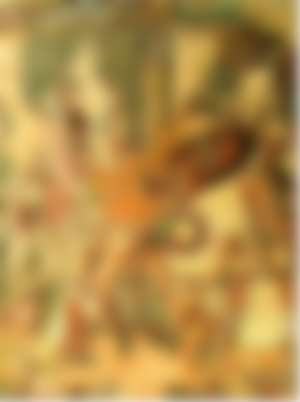
According to another legend, Achilles asked Tindarei for the hand of his daughter Helena. After he rejected him, he fought a war with Tanagra, whose king did not want to go to the Trojan War, and he also occupied the island of Skir to avenge his father's friend Theseus. On Skir, Achilles reconciled with Lycomedes and married Daydamia. When the Greek army gathered at Aulida, Thetis returned him to Phthias, giving him the weapons Hephaestus had given Peleus as a wedding gift, the divine horse Peleus had received from Poseidon, and the slave Mnemon, whose duty it was to prevent Achilles from conflicts with the son of Apollo.
According to the oldest legend, the Greeks arrived without difficulty from Aulida before Troy. It was later rumored that the Greek fleet, in confusion, first sailed to Moesia. Convinced that they were in Troas, the Greeks began to ravage that country, until the appearance of Hercules' son Telephus, who managed to suppress them. Only Achilles and Patroclus remained on the battlefield; Achilles pursued Telephus and wounded him in the leg with a spear. After that skirmish, the Greeks directed the ships towards Troas, but their fleet was destroyed by a storm, which threw Achilles on the island of Skir. Achilles returned to Greece, where Telephus found him and begged him to reconnoiter his wound. When, after eight years, the Greek fleet regrouped at Aulida, Telephus was ready to show the Greeks the way to Troy, but the winds prevented the departure of the ships. In order for the fleet to set off, Agamemnon had to sacrifice his most beautiful daughter, Iphigenia.
Odysseus and Taltibius brought Iphigenia to Aulid, allegedly with the intention of marrying Achilles. Her mother Clytemnestra revealed to Achilles Agamemnon's true intention; Achilles tried to save the girl, but when the army wanted to stone him, Iphigenia volunteered to die. Only then did the Greek fleet, under the leadership of Telephus, set out for Troy. During a short stay in Tened, Agamemnon prepared a great feast, but he did not invite Achilles in time, which is why he had a serious conflict with him for the first time. During his stay on the island, Achilles killed Thenedos, the son of Apollo (picture below).

The following is said about the disembarkation of the Greeks in Troas: Thetis warned her son that the first Greek to enter Trojan soil would be killed, and therefore Achilles was the last to jump out of the ship or did so immediately after Protesilaus. Achilles' leap was so violent that a spring opened under his feet. He immediately suppressed the enemy and stoned Poseidon's son Kikn to death. It was only then that the Greeks pulled the boats ashore and built a camp. They remained in front of the walls of Troy for nine years, and since they did not succeed in conquering the city, the army wished to return to their homeland. To dissuade her from this, Achilles set out on a campaign against the cities of Asia Minor and devastated the whole of Troas. He first seized the cattle that were guarding Aeneas on Ida; in the process, he killed Priam's son Mesther, and released his brothers Isa and Antifa only after he received a large compensation. Aeneas escaped and took refuge in Lirnes; Achilles followed him and destroyed the city, but Aeneas escaped him again. In Lirnes, during the division of the spoils, Achilles received Briseis (Hippodamia) and Astinomus. While on that expedition, Odysseus slandered his friend Palamedes, who, with Agamemnon's consent, was stoned. Because of this, Achilles became angry and clashed with Agamemnon for the second time. One night he captured the Trojan prince Lycaon, and later he killed Priam's youngest son Troilus. When he wanted to see the beautiful Helena, Aphrodite and Thetis enabled him to see her first in a dream, and later in front of the walls of Troy. Achilles conquered both the city of Pedas and Thebes in Asia Minor, where he killed Andromache's father, King Etion, and his seven sons, and captured the queen. He also brought from You the horse of Pedas, whom he harnessed to his immortal horses. Achilles conquered many cities and islands: Colophon, Smyrna, Klazomena, Andar, Lesbos and Skir. At the same time, he received the most beautiful girls as prey, among them Briseis, whom Zeus predestined to separate Achilles from the Greek army.
In the tenth year of the war, Achilles and Agamemnon clashed over the beautiful slave girl Briseis. When he was forced to surrender to Agamemnon, Achilles retreated to his tent and gave up the fight with the Trojans. He angrily went to the seashore, called his mother Thetis and asked her to beg Zeus for the victory of the Trojans. Although reluctant, Zeus promised Thetis that the Greeks would not win until he reconciled with Achilles. After the successive defeats of the Greek army, Agamemnon sent a message to Achilles and promised him the most wonderful gifts, to Briseis, the twenty most beautiful Trojans, the hand of one of his daughters and the seven cities of the moon. Achilles kindly received the deputies, but he stuck to his decision. Then Nestor asked Patroclus to persuade Achilles to return to battle or to allow Patroclus to appear on his battlefield in his war gear, so that the Trojans would think that Achilles was taking up arms again. It was only when the Trojans broke into the Greek camp and started burning the ships that Achilles gave Patroclus his weapon and allowed him to lead the Myrmidons into battle. Patroclus pushed the enemy to the walls of Troy, but there Hector killed him and took off his Achilles' war gear. A fierce battle broke out around Patroclus' corpse; it was only when, at Hera's urging, Achilles appeared with Athena's aegis and a fiery cloud around her head that the Trojans withdrew.

The Achilles' mourning for Patroclus was heard by Thetis, who, with her sisters Nereids, came out of the depths of the sea and promised her son that she would bring him a new weapon from Hephaestus the very next day. Achilles swore that he would not bury Patroclus until he brought Hector's head and weapons on his bonfire, and sacrificed twelve Trojan young men on it. The next day, Thetis brought her son new war equipment (pictured above), and Achilles told the Greeks that he was ready to reconcile with Agamemnon and return to the battlefield. Having received Briseis and rich gifts, he jumped into the chariot, and then ordered his divine horses - Xanthus and Bali - to carry him alive through the hustle and bustle of war. Xant told him that he could still save him today, but that the day of his death was approaching. While searching for Hector on the battlefield, Achilles met Aeneas, when Apollo persuaded him to oppose him. Achilles wounded Aeneas and then killed several of the bravest Trojans, including Priam's son Polydorus. When he learned of Polidor's death, Hector set out to find Achilles, but the gods postponed their meeting. On the shores of Scamander, Achilles captured twelve young Trojans, which he intended for Patroclus' shadow. When he killed Peontus Asteropaius, he incurred the wrath of the god of the river Scamander, who poured out his waters and endangered Achilles' life. Only when the gods intervened and when Hephaestus, at Hera's request, lit a fire that forced the waters of Scamander to retreat, Achilles managed to save himself and return to the walls of Troy. There, in front of the Skate Gate, he met Hector. When he spotted Achilles, Hector fled, but Achilles followed him, so that the heroes ran around the city walls three times. When they ran around Troy for the fourth time, Zeus decided to weigh their destinies. The bowl on which Hector's destiny rested descended toward Hades; then Apollo left Hector, and Athena, in the form of his brother Deiphobus, deceived him and kept him on the battlefield. Achilles killed Hector, then tied his body to his car and dragged him to a Greek camp (picture below).

After fulfilling his vow, Achilles began preparations for Patroclus' funeral. Together with the Myrmidons, he drove around Patroclus' body three times, and then prepared a funeral feast. After that ceremony, Achilles went with the Myrmidons to the seashore, where he was overcome by sleep. In his dream, Patroclus appeared to him, begging him to bury him with dignity as soon as possible, so that he could enter the realm of the dead. The next day, the Greeks raised a huge bonfire and Achilles sacrificed twelve Trojan young men on it. He poured liquid sacrifices all night, and at dawn he extinguished the flame of the bonfire with wine and collected Patroclus' powder in a golden urn. Competitions were organized in Patroclus' part, in which the greatest Greek heroes participated.
Achilles continued to pity Patroclus and dragged Hector's body around his friend's mound three times a day. Apollo protected the body of the Trojan hero from injury, until Thetis told Achilles that the gods were angry because of his actions. Accompanied by Hermes, the reception came to Achilles' tent to beg his son's body from the greatest Greek hero. Remembering his old father and moved by the pain of the Trojan king, Achilles handed over Hector's corpse to Priam.
Later legends mention the fight of Achilles with Penthesilea, the queen of the Amazons. She came to the aid of the Trojans at the moment when they were organizing funeral ceremonies in Hector's honor. When she and her Amazons pushed the Greeks all the way to their camp, she fell at the hands of Achilles. It was only when he plunged his sword into her chest that Achilles saw the face of the Amazon queen and, overshadowed by his beauty, surrendered to sincere pain (picture below). Tersit mocked his feelings and Achilles killed him for it. Later, the love of Achilles and Penthesilea was told, as well as their son Kaister.
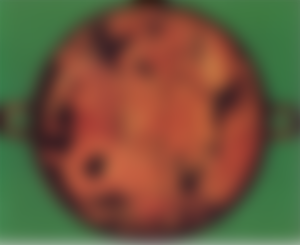
After defeating Memnon, the son of the goddess Eos, Achilles reached the Gate of Scythia, where Paris, with Apollo's help, shot him in the heel, the only vulnerable spot on his body. Apollo himself is sometimes mentioned as Achilles' murderer. Some say that Achilles loved Priam's beautiful daughter Polyxena and that that love cost him his life. The fight over Achilles' corpse was so fierce that not even the night interrupted it, but Zeus with a terrible storm. The next day, while Odysseus was pushing the Trojans, Ajanta grabbed Achilles' body and brought it to the Greek camp. Everyone mourned Achilles' death, and Tethys arrived at the funeral accompanied by muses and nereids (picture below). Athena protected Achilles' body from decay with ragweed. After the bonfire was extinguished, Achilles 'ashes were buried, together with Patroclus', in a golden urn, which Dionysus gave to Thetis. In the competitions that were organized after that, the main prize was Achilles' expensive war equipment, for which Odysseus and Ajanth competed.

Achilles' soul went to the underworld. It was later narrated that Thetis took Achilles to the island of Leuca, at the mouth of the Danube, where the divine part of his being continued to live. There Achilles married Iphigenia, Medea, Helen or Polyxena.
Achilles is revered in several places in Greece (Epirus, Thessaly, Laconia), as well as in southern Italy and Sicily. His sanctuaries on the Black Sea are the most numerous, and the most famous is the temple that was built for him on the island of Leuci. The meaning of his name is uncertain, and it first appears around 1400 AD on a tablet from Knossos.
The myth of Achilles has inspired many literary works. It is often shown in fine arts. In addition to his cult statue on the island of Leuci, one equestrian statue of Achilles in Delphi is mentioned, as well as the famous Skopas group, which depicts the goddess Thetis bringing Achilles a weapon. The famous painter Polygnotus presented Achilles in the underworld (in Delphi) and Achilles among Lycomedes' daughters (in Athens). In important painting, Achilles chasing Troilus or Achilles pulling Hector's corpse is most often depicted. The most famous is Hezekiah's amphora, in which Achilles is depicted gambling with the Great Ajanta (last decades of the 6th century AD), then Socia's Cup (Achilles bandaging Patroclus' wounds - around 500 AD) and the Cup from Vulcius (Achilles kills Pentesile - around 460 AD). In Pompeii, the frescoes show Chiron teaching Achilles, as well as Achilles among Lycomedes' daughters.
Literature:
• Dragoslav Srejović - Aleksandrina Cermanović-Kuzmanović, Recnik grčke i rimske mitologije, drugo izdanje, Beograd: Srpska književna zadruga, 1987

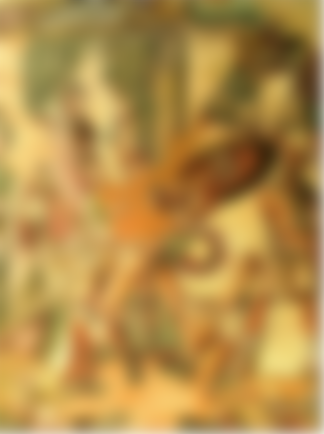
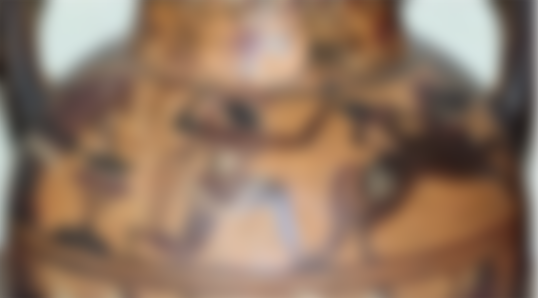
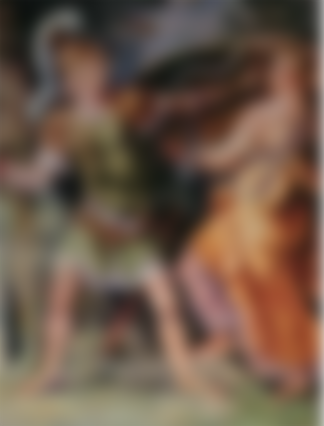
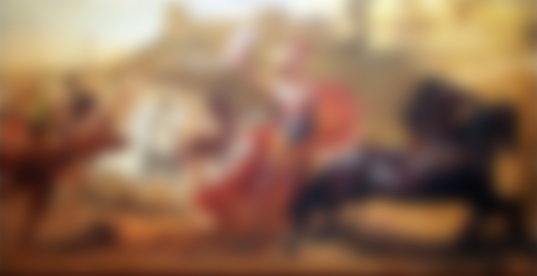
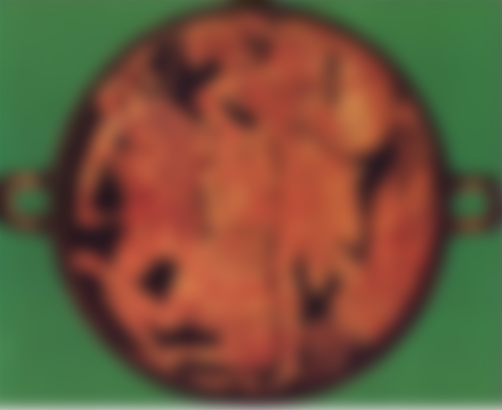
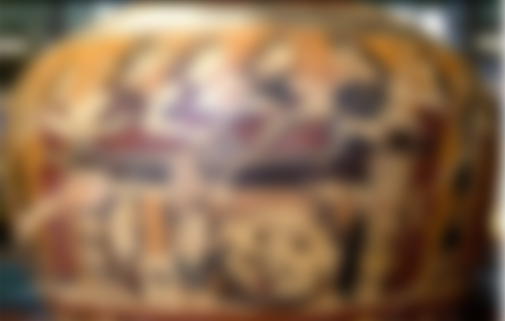
mythology classes - Achilles' heel, a weakness we mention as Samson's hair. Very interesting article